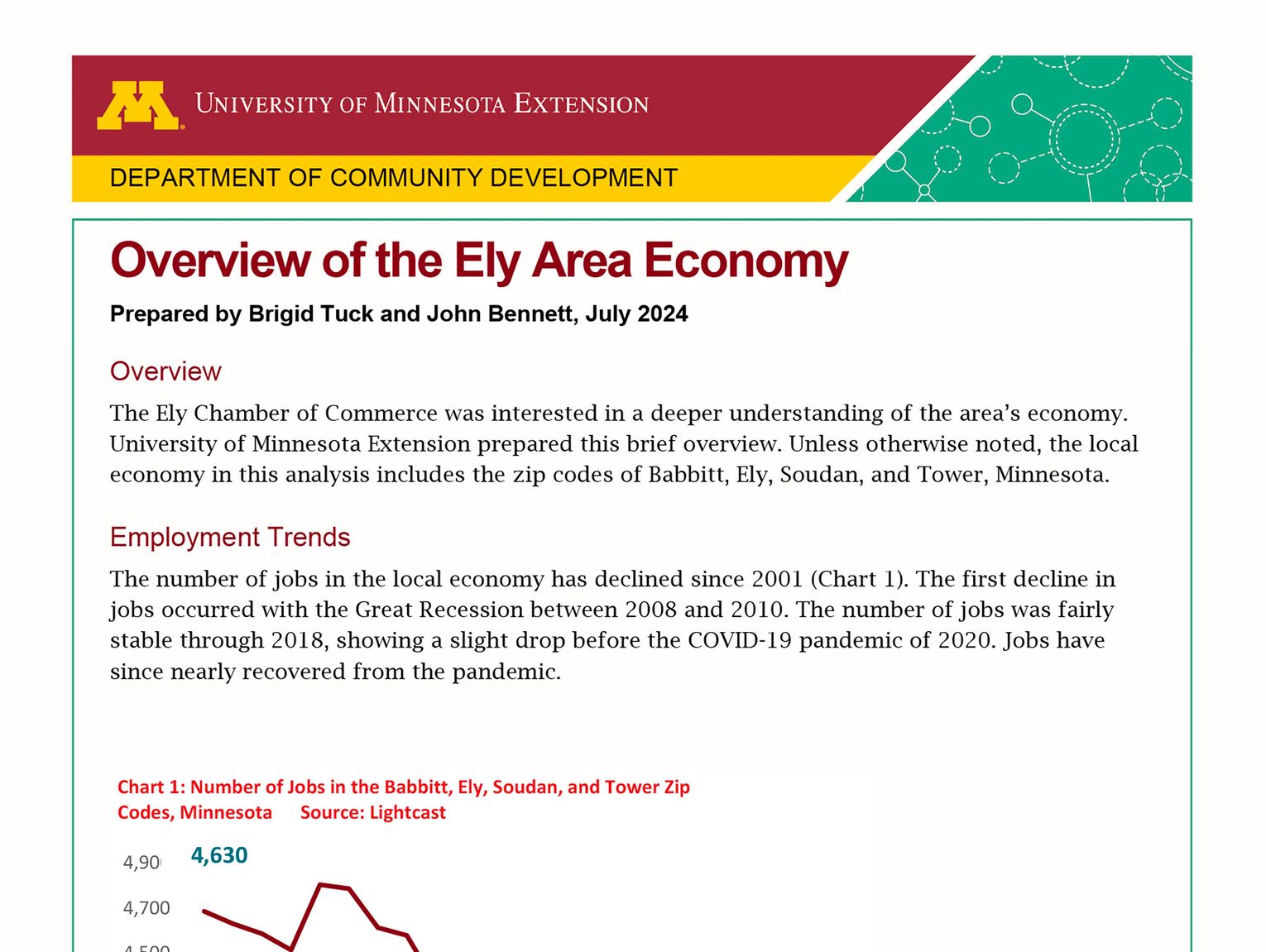Employment dips since ’05, but up slightly from pandemic lows
A study commissioned by the Ely Chamber of Commerce and conducted by the University of Minnesota shows that employment in the region has declined significantly in the last 20 years, and that wages here lag far behind state averages Those were two of the key points in the study, conducted by the University of Minnesota Extension’s Department of Community Development.
Researchers Brigit Tuck and John Bennett compiled an array of workforce and industry data for Ely, Winton and the nearby Babbitt and Tower-Soudan areas, and one notable finding showed that the number of total jobs peaked at 4,700 in 2005 sunk to as few as 3,700 during the Covid-19 pandemic and has since climbed back to 4,150.
No differentiation was made between full and parttime jobs in the report.
Meanwhile, average weekly wages in the area are $775, a whopping 44 percent lower than the state average of $1,389.
Tuck and Bennett dug deep into data and came up with an assortment of findings related to employment in the Ely area, and in comparison to other regional communities.
Since 2010, the Ely area has experienced a 4.2 percent decrease in jobs, but over the same period of time both the Hibbing/Chisholm and Virginia/Eveleth areas had increases of nearly eight percent.
The researchers also report that the workforce, or those available to work, in greater St. Louis County, tumbled from a high of near 57,000 in 2017 to as little as 54,500 during the Covid-19 pandemic. That number has since increased slightly to about 55,000.
The overall decline in workforce may be in part due to aging region.
In 2010, 76 percent of the area’s population was under 64 years of age, and that number has since slipped to 68 percent.
The study also shows that the highest number of jobs in the Ely, Babbitt, and Tower areas are tourism related, with over 800 jobs in the leisure and hospitality categories, followed by over 450 in the trades and over 400 in other services. Healthcare comes fourth, with just over 400 workers.
From 2010 to 2023, healthcare has added over 150 jobs, and manufacturing has added over 70. The number of workers in tourism-related positions has decreased by 150, while professional and business services have also seen a decline of over 160 positions during the same period.
The prevalence of tourism- related jobs also figures into the lagging wages in the Ely area, with average weekly wages barely more than half of the average wage statewide.
When comparing different industries, the education and healthcare sector has a weekly wage of $1,395, which is slightly higher than the state average. The professional and business services sector has an average weekly wage of $1,134. Weekly wages in the tourism sector amount to $432, while those in the trade, transport, and utilities sector are slightly higher at $497. The financial services sector falls in the middle, with an average weekly wage of $793.
A final area of research showed the commuting patterns of area residents. Of the 830 working residents, 400 held jobs within Ely. The remaining 430 commuted outside of the city, while 678 individuals commuted to Ely to work.
Prior to the pandemic, data showed that the accommodations sector of the regional economy was growing, while the food and beverage and arts and recreation sectors were declining.
During the pandemic, food and beverage employment declined by 40 percent, but that sector has since seen a nearly 30 percent jump in employment, with arts and recreation employment climbing by nearly 60 percent.
A news release issued by the Ely Chamber of Commerce in conjunction with the report noted that “Area leaders have recognized and are working toward solutions in three key areas, including childcare, housing, and workforce, to allow area businesses and organizations to grow.”
The Chamber cited the opening of The Hub, which includes a community-based child care center with space for over 40 children, as a factor in aiding some households to return to two-paycheck families.
“The Hub’s success in addressing the childcare issue is a testament to the power of community-driven solutions in overcoming economic challenges,” read the Chamber release.
A lack of housing was cited as a second key point that can directly impact Ely’s workforce and Chamber officials said “We know Ely’s elected officials are diligently working to create housing solutions that can in turn lead to workforce solutions.”
For a copy of the report, contact the Chamber at 218365-6123. It will also be posted on the elyecho.com website.









.jpeg)
